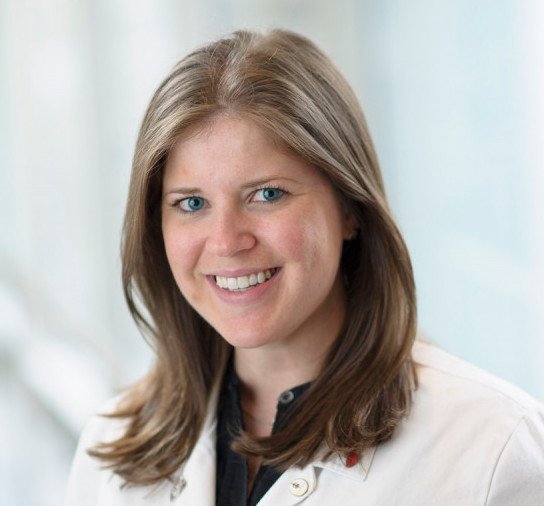Partnering to Navigate a Mantle Cell Lymphoma (MCL) Diagnosis: Insights from a Hematology Nurse

 When Susan McCall, a nurse practitioner at Memorial Sloan Kettering Cancer Center in New York, talks to patients who have just received a diagnosis of mantle cell lymphoma (MCL), facilitating her patients’ understanding is just as critical as the clinical work she delivers. She’ll ask questions that focus on the emotional and psychological impact of their diagnosis — How are you interpreting everything we’re telling you? Are you feeling anxious about what we’re telling you? What are you really feeling about all this?
When Susan McCall, a nurse practitioner at Memorial Sloan Kettering Cancer Center in New York, talks to patients who have just received a diagnosis of mantle cell lymphoma (MCL), facilitating her patients’ understanding is just as critical as the clinical work she delivers. She’ll ask questions that focus on the emotional and psychological impact of their diagnosis — How are you interpreting everything we’re telling you? Are you feeling anxious about what we’re telling you? What are you really feeling about all this?
“Sometimes patients tell me, ‘I’m so anxious and I’m so scared, I didn’t hear a thing you just told me,’” McCall said.
When diagnosed with MCL, a rare form of blood cancer that causes lymphocytes (a type of white blood cell) to grow and multiply uncontrollably, most people experience the range of emotions McCall is describing in her experience as a nurse.
MCL is a rare form of non-Hodgkin lymphoma (NHL) originating from the part of the lymph node called the “mantle zone.” MCL accounts for 7% of all NHL within the United States each year.1
“If patients want to know more about their diagnosis and/or how to cope with it, I always encourage them to ask. We’re here to support them in any and every way we can.”
Click HERE to watch a new educational video series on living with MCL spotlighting leading hematology nurses across the U.S., including Susan, featured by YOUR Cancer.
Education
A cancer diagnosis of any kind is often the start of an emotional roller coaster of uncertainties, questions, and anxiety – and there is no single blueprint for how patients should manage the information since the needs of one patient may be different from another. Similarly, the path forward with a rare cancer such as MCL comes with no instructions. That’s where McCall comes in – having walked alongside so many individuals through their MCL journey, it’s “very difficult” to surprise her with a new question or issue that another patient hasn’t raised to her at some point before, she says. She’s discovered a few key ways for patients and their friends, families and caregivers to understand an MCL diagnosis and feel empowered to participate in their care decisions, share their concerns, and ask questions throughout the process.
McCall believes that an MCL patient’s experience should start with education, not only about what exactly MCL is but also some of the other things patients may encounter along the way, such as understanding the various treatment options and how they work. A comprehensive care team, including oncologists and oncology nurses, radiologists or lab technicians and hematopathologists, will walk through the objective information patients need to know about MCL, which can help relieve some of the anxiety. A key component of that education is to ensure patients understand that MCL is a unique disease with its own prognosis.
Caregivers and Resources
A critical element of the educational experience is feeling empowered to ask questions. McCall assures patients and caregivers that all questions are fair game, whether they are clinical or emotional. She encourages patients to speak freely because the priority is making sure everyone understands the care being provided.
However, getting answers to questions is often easier said than done. That’s where a support system can help. By surrounding themselves with supporters, such as a partner, family member, friends, and others, these individuals can provide help during appointments by taking notes or asking questions, and by following up with members of the care team to ensure they obtain answers.
Not every patient has a large support network to draw from. In this case, McCall recruits the medical facility’s social worker or a patient advocate who can help fulfill the role of supporting a patient and advocating alongside them. They can help find programs and resources, and allow patients to feel connected to someone during their journey. McCall’s advice is for all patients to ask their medical team to connect them with a social worker or patient advocate. Virtual connections through social media and online patient advocacy groups, as well as in-person support groups, can also add to a patient’s social support network.
Communication
At the doctor’s office, communication is crucial. To make the most of these appointments, it can be helpful to prepare a list of medications being taken and to write down questions to ask the clinical team. “It’s important that patients talk with their medical team with an open mind, ready to share and to hear new information,” says McCall.
Of course, open communication can be challenging given the very personal nature of a cancer diagnosis. As McCall admitted, patients may need to disclose private details about themselves, like fertility and sexual function, as part of their clinical assessment. However, it is always the medical team’s goal to provide the best course of care, depending on the wishes of the patient. Care teams can even adjust treatment schedules around important life events — for example, if a patient wished to attend a wedding.
No matter how understanding the medical team is, and no matter the support system, it’s still possible to experience anxiety and depression — and that’s completely normal. McCall said people with slower-growing forms of MCL often experience the unique anxiety of knowing they have a disease but not being able to treat it just yet (a period called “expectant observation” that may come before treatment begins). A phenomenon known as “scan-xiety,” or anxiety about upcoming scans, is also a very real emotion.
Mental health is just as important as physical health and is something that McCall urges all patients to discuss with their care teams. During the MCL journey, the medical care team can develop a plan that could support connections to social workers, therapists, psychologists, and other professionals, as needed. Above all, patients should know they are not the only ones going through these challenges and there is a comprehensive care team to provide support every step of the way.
“A lot of the things patients express are quite common, and I try and reassure them they’re not unusual,” McCall said. “They’re not black sheep and we are aware these symptoms exist in more than one person, and we have resources to help them deal with it.”
Outside the doctor’s office, every patient should ideally have a coping method or two that they rely on — something that helps them relax and de-stress. Perhaps it’s yoga, travel, or reading. McCall also recommends exercise, which has been shown to help with both fatigue and depression.
A cancer diagnosis can be one of the most confusing and overwhelming moments in life for anyone – but there are many people, from medical and care teams to friends, family, and other caregivers – plus a whole host of online resources and advocacy groups, who are here to help patients navigate the disease, understand their treatment options, and provide emotional and physical support.
“We are learning so much about MCL and the biology of the disease. Our ability to treat and care for an MCL patient has increased tenfold in the last ten or 20 years,” McCall said. “If patients want to know more about their diagnosis and/or how to cope with it, I always encourage them to ask. We’re here to support them in any and every way we can.”
Click HERE to watch a new educational video series spotlighting leading hematology nurses sharing their insights on what people living with mantle cell lymphoma (MCL) need to know. Feel free to share these videos – featured by YOUR Cancer, a leading community engagement and support program for those living with and affected by cancer – with others in your network that are impacted by MCL to help them get the support and resources they need.
This article was supported by AstraZeneca
_______________________
1Ghobadi A. Chimeric Antigen Receptor T cell Therapy for Non-Hodgkin Lymphoma. Curr Res Transl Med. 2018;66(2):43-49.

